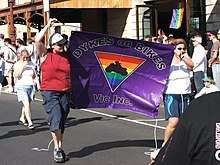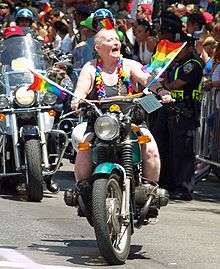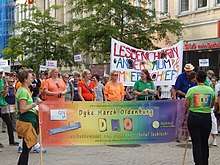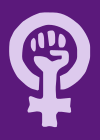Dyke (slang)
The term dyke is a slang term, used as a noun meaning lesbian and as an adjective describing things associated with lesbianism. It originated as a homophobic and misogynistic slur for a masculine, butch, tomboyish, or androgynous girl or woman. While pejorative use of the word still exists, the term dyke has been reappropriated by out and proud lesbians to imply assertiveness and toughness, or simply as a neutral synonym for lesbian.[1]
.jpg)
Origins
The origin of the term is obscure and many theories have been proposed.[2][3][4][lower-alpha 1] The Oxford English Dictionary notes the first attestation as Berrey and Van den Bark's 1942 American Thesaurus of Slang.[5] There, dike was the more common term.[5] From the mid-19th century to the early 20th century, dike had been American slang for a well-dressed man, with "diked out" and "out on a dike" indicating a young man was in his best clothes and ready for a night on the town. The etymology of that term is also obscure, but may have originated as a Virginian variant of deck and decked out.[6]
However, the term bulldyker preceded dyke in print, appearing in Harlem Renaissance novels in the 1920s.[2] Claude McKay's 1928 Home to Harlem includes the passage that lesbians are "what we calls bulldyker in Harlem... I don't understan'... a bulldyking woman." From the context in the novel, the word was considered crude and pejorative at the time. This may be related to the late-19th-century slang use of dike ("ditch") for the vulva.[7] Bull ("male cattle") being used in the sense of "masculine" and "aggressive" (e.g., in bullish), a bulldyke would have implied (with similar levels of offensiveness) a "masculine cunt". Other theories include that bulldyke derived from morphodite, a variant of hermaphrodite,[1] used for homosexuals in the early 20th century; that it was a term for stud bulls and originally applied to sexually successful men;[8] or that it was a dialectical corruption of the name of the rebel Celtic queen Boadicea.[1][3]

In an investigative study, Julia Stanley theorizes that the source of these varying definitions stems from gender-determined sub-dialects.[9] Homosexuality in America is a “subculture with its own language.”[9] As such, a special vocabulary is developed by its members. Previously, male homosexuals defined dyke as lesbian without derogation. A bull dyke was also defined as a lesbian without further distinction. For female homosexuals of the community, however, a dyke is an extremely masculine, easily identified lesbian, given to indiscretion. Bull dyke is an extension of this term, with the addition of this person described as nasty, obnoxiously aggressive, and overly demonstrative of her hatred of men.[9]
In an alternative investigation, Susan Krantz discusses the etymology of bulldyke, with derivations of the Middle English “falsehood” for bull and dick for dyke (Farmer and Henley 1891).[1] Therefore, a possible origin for a masculine lesbian comes from bulldicker that could specifically mean “fake penis,” denoting a “false man.”[1] Further speculation talks of the synonymous term bulldagger. Here, dagger also alludes to the male genitalia and bull referring to "false" rather than "man". The earliest account of dagger in this context stems from an account in 1348 by Henry Knighton.[1]
In the 1950s, the word dyke was used as a derogatory term used by straight people, and by lesbians who were most likely to be able to move up in social class. The term was meant to identify crude, rough-bar lesbians. In 1971, the poem The Psychoanalysis of Edward the Dyke by Judy Grahn was published by the Women's Press Collective.[10][11] This use of dyke empowered the lesbian community because heretofore it had only been employed as a condemnation. Because of the exposure of the word to the public, the term dyke was officially reclaimed by the lesbian community in the 1970s.[12]
Increasing acceptance


The meaning of dyke has positively changed over time. Most members of the community have dropped bull from the term to use it as a positive identifier of one who displays toughness, or as a simple, generic term for all lesbians. This abbreviation does not carry the negative connotations of the full phrase as it previously did.[1] Scholar Paula Blank, in an article on lesbian etymology, calls for taking ownership of lesbian and similar words.[13]
In the late 20th and early 21st century, the term dyke was claimed by many lesbians as a term of pride and empowerment.[14][15] Alison Bechdel, author of comic strip Dykes to Watch Out For (1983–2008),[16] said use of the term was "linguistic activism".[15] The strip depicts the lives of a lesbian community and is one of the earliest representations of lesbians in popular culture.[17] It has been described "as important to new generations of lesbians as landmark novels like Rita Mae Brown's Rubyfruit Jungle (1973) and Lisa Alther's Kinflicks (1976) were to an earlier one."[18]
In her 2011 article The Only Dykey One, Lucy Jones argues that consideration of lesbian culture is core to an understanding of lesbian identity construction.[19] Matters came to a head when the United States Patent and Trademark Office denied the lesbian motorcycle group Dykes on Bikes a trademark for its name, on the grounds dyke was offensive, derogatory and disparaging to lesbians. However, the office reversed itself and permitted the group to register its name after attorneys appealed and submitted hundreds of pages to show the slang word does not disparage lesbians in the way it once did.[20] On December 8, 2005, Dykes on Bikes won the trademark case,[21] and the organization has since gained international recognition for leading San Francisco's gay pride parade.
Much of the gay slang that is used today was once seen by the public as self-destructive and demeaning, especially when it was used within the LGBT community. In 1969, people in the gay community began to march in the streets to demand civil rights. If used, terms such as dyke and faggot were used to identify people as political activists for the gay community. During this time, dyke referred to a woman committed to revolution, the most radical position. A surge of feminism in the lesbian community led to "dyke separatism", which emphasized that lesbian women should consider themselves to be separate from men and their ideas and movements.[22]
Dyke March

Dyke Marches have become popular gay pride events nationwide in the United States and Canada. They are generally non-commercial, in sharp contrast to corporate-sponsored pride events, and some are participated in by bisexual and trans women. The stated mission of the Boston Dyke March, for example, is "to provide a dynamic and welcoming space for participants of all sexualities, genders, races, ages, ethnicities, sizes, economic backgrounds, and physical abilities."[27] Marches also take place in several European cities. The United Kingdom's first Dyke March was held in London in 2012.[28] In Germany, the annual Dyke March Berlin was established in 2013.[29][30] In Mexico, the Marcha Lésbica (Lesbian March) was founded in March 2003 and is held biannually in Mexico City.[31][32][33]
Dyke bar
A dyke bar is any bar or club frequented by lesbians, and is considered as slang in the vocabulary of the LGBT community.
Notes
- For other meanings and use of "dyke" or "dike", see Dyke (disambiguation).
References
- Krantz, Susan E. (1995). "Reconsidering the Etymology of Bulldike". American Speech. 70 (2): 217–221. doi:10.2307/455819. ISSN 0003-1283. JSTOR 455819.
- Spears, Richard A. (1985). "On the Etymology of Dike". American Speech. 60 (4): 318–327. doi:10.2307/454909. ISSN 0003-1283. JSTOR 454909. OCLC 913655475. JSTOR.
- Grahn, Judy (1984). "Butches, Bulldags, and the Queen of Bulldikery". Another Mother Tongue: Gay Words, Gay Worlds (1990 Expanded ed.). Boston, Massachusetts: Beacon Press. pp. 133–161. ISBN 0-8070-7911-1.
- Dynes, Wayne R. (1991). The Encyclopedia of Homosexuality. Garland Publishing. pp. 335–336.
- "dyke, n.³", Oxford English Dictionary, Oxford: Oxford University Press, 1972.
- "dyke, n.²", Oxford English Dictionary, 2nd ed., Oxford: Oxford University Press, 1989 [1933].
- "dyke", Online Etymology Dictionary.
- Herbst, Phillip (2001). Wimmim, Wimps, & Wallflowers: An Encyclopaedic Dictionary of Gender and Sexual Orientation Bias. Intercultural Press. p. 332. ISBN 978-1-877864-80-3..
- Stanley, Julia P. (1970). "Homosexual Slang". American Speech. 45 (1/2): 45–59. doi:10.2307/455061. JSTOR 455061.
- "Edward the Dyke: and Other Poems". Barnard Center for Research on Women (BCRW) Archives. Retrieved 24 May 2019.
- Moore, Lisa L. (August 23, 2013). "It Is An Apple: An Interview With Judy Grahn". Los Angeles Review of Books. Retrieved 24 May 2019.
- Garber, Linda (2001). "Putting the Word Dyke on the Map: Judy Grahn". Identity Poetics: Race, Class, and the Lesbian-Feminist Roots of Queer Theory (1st ed.). New York: Columbia University Press. pp. 31–62. ISBN 0-231-11032-4.
- Blank, Paula (2011). "The Proverbial "Lesbian": Queering Etymology in Contemporary Critical Practice". Modern Philology. 109 (1): 108–134. doi:10.1086/661977. JSTOR 10.1086/661977.
- Dalzell, Tom (2010). Damn the Man!: Slang of the Oppressed in America. Mineola, New York: Dove Publications. pp. 160–161. ISBN 978-0486475912.
- Raab, Barbara (June 23, 2006). "Sticks & Stones and Dykes". In These Times. Archived from the original on August 18, 2007. Retrieved 1 August 2019.
- Bechdel, Alison (2018). "Dykes to Watch Out For". dykestowatchoutfor.com. Archived from the original on January 1, 2018. Retrieved 18 February 2019.
- Bolonik, Kera (November 23, 2008). "Alison Bechdel Retires Her Infamous "Dykes"". New York. Archived from the original on February 13, 2009. Retrieved 18 February 2019.
- Garner, Dwight (December 2, 2008). "The Days of Their Lives: Lesbians Star in Funny Pages". The New York Times. Retrieved 17 February 2019.
- Jones, Lucy (2011). "'The only dykey one': constructions of (in)authenticity in a lesbian community of practice". Journal of Homosexuality. 58 (6–7): 719–41. doi:10.1080/00918369.2011.581917. PMID 21740207.
- Anten, Todd (2006), "Self-Disparaging Trademarks and Social Change: Factoring the Reappropriation of Slurs into Section 2(a) of the Lanham Act" (PDF), Columbia Law Review, 106 (2): 388–434, ISSN 0010-1958, JSTOR 4099495, archived from the original (PDF) on April 26, 2006, retrieved 12 July 2007
- Guthrie, Julian (December 9, 2005). "Trademark office OKs 'Dykes on Bikes' / Motorcycle group's name on its way to becoming registered". San Francisco Chronicle. Archived from the original on July 24, 2012. Retrieved 1 August 2019.
- Stanley, Julia P. (1974). "When We Say "Out of the Closets!"". College English. 36 (3): 385–391. doi:10.2307/374858. JSTOR 374858.
- Murphy, Meghan (June 26, 2017). "Why is Facebook banning lesbians for using the word 'dyke'". Feminist Current. Retrieved 9 May 2019.
- Thompson, Annabel (July 12, 2017). "The controversy around Facebook banning lesbians from using the word 'dyke'". ThinkProgress. Retrieved 9 May 2019.
- Sharpe, Kenny (July 27, 2017). "Users face consequences as Facebook struggles to filter hate speech". The Globe and Mail. Retrieved 9 May 2019.
- Facebook: Stop Discriminating Against Lesbians. Change.org. July 2, 2017. Retrieved 9 May 2019. @ https://www.change.org/p/facebook-stop-discriminating-against-lesbians. (The URL for Change.org is blocked due to spamming and cannot be linked with a citation template.)
- "About". Boston Dyke March. 2019. Retrieved 30 April 2019.
- petit fours (February 26, 2012). "Dyke March London: what is it? and why do we need one?". The Most Cake. Retrieved 5 June 2019.
- "Dyke March Berlin". dykemarchberlin.com (in German). Retrieved 5 June 2019.
- "Dyke March Berlin". Berlin Pride Guide. 2018. Retrieved 5 June 2019.
- "Marcha Lésbica". marchalesbica.com (in Spanish). Retrieved 5 June 2019.
- Martínez, Martha (21 March 2003). "Realizan en México la primera marcha lésbica de América Latina". Cimacnoticias (in Spanish). Retrieved 5 June 2019.
- Sanchez, Mayela (March 20, 2013). "Mexico's young LGBT women take a stand at lesbian march". United Press International (UPI). Retrieved 5 June 2019.
Further reading
- Bates, Gloria (June 6, 2018). "Dyke: A Fracture In the Lesbian Community". Medium.
- Bendix, Trish (June 23, 2017). "Dyke Marches Assert Political Power and Demand Visibility. But They're Under Threat". Outward. Slate.
- Levy, Ariel (March 2, 2009). "Lesbian Nation". The New Yorker. (article about the Van Dykes collective)
- Morris, Bonnie J. (December 22, 2016). "Dyke Culture and the Disappearing L". Outward. Slate.
- Smith, Kristin (June 21, 2011). "The Lez Look Book". The Bold Italic.
- Books and journals
- Beers, Jinx (2008). Memoirs of an Old Dyke. Bloomington, Indiana: iUniverse. ISBN 978-0595526246.
- Eliason, Michele J. (20 July 2010). "A New Classification System for Lesbians: The Dyke Diagnostic Manual". Journal of Lesbian Studies. 14 (4): 401–414. doi:10.1080/10894161003677133. ISSN 1089-4160. OCLC 795931159. PMID 20661801.
Special Issue: A History of "Lesbian History," Part 2
- Jay, Karla, ed. (1995). Dyke Life: From Growing Up To Growing Old, A Celebration Of The Lesbian Experience. Basic Books. ISBN 978-0465039074.
- Kleindienst, Kris, ed. (1999). This Is What Lesbian Looks Like: Dyke Activists Take on the 21st Century (1st ed.). Firebrand Books. ISBN 978-1563411175.
- Knadler, Stephen P. (Winter 2002). "Sweetback Style: Wallace Thurman and a Queer Harlem Renaissance". Modern Fiction Studies. 48 (4): 899–936. doi:10.1353/mfs.2002.0076. ISSN 0026-7724. JSTOR 26286254. OCLC 436657207.
External links
| Look up dyke in Wiktionary, the free dictionary. |
- Dyke at Online Etymology Dictionary
- Dyke at Wordorigins.org
- Dyke, A Quarterly, published 1975–1979 (annotated archive, live website)
- Dykes to Watch Out For, comic strip by Alison Bechdel
- "Dyke Beer". Jean-Nickolaus Tretter Collection in Gay, Lesbian, Bisexual and Transgender Studies. University of Minnesota Libraries. 2015.
